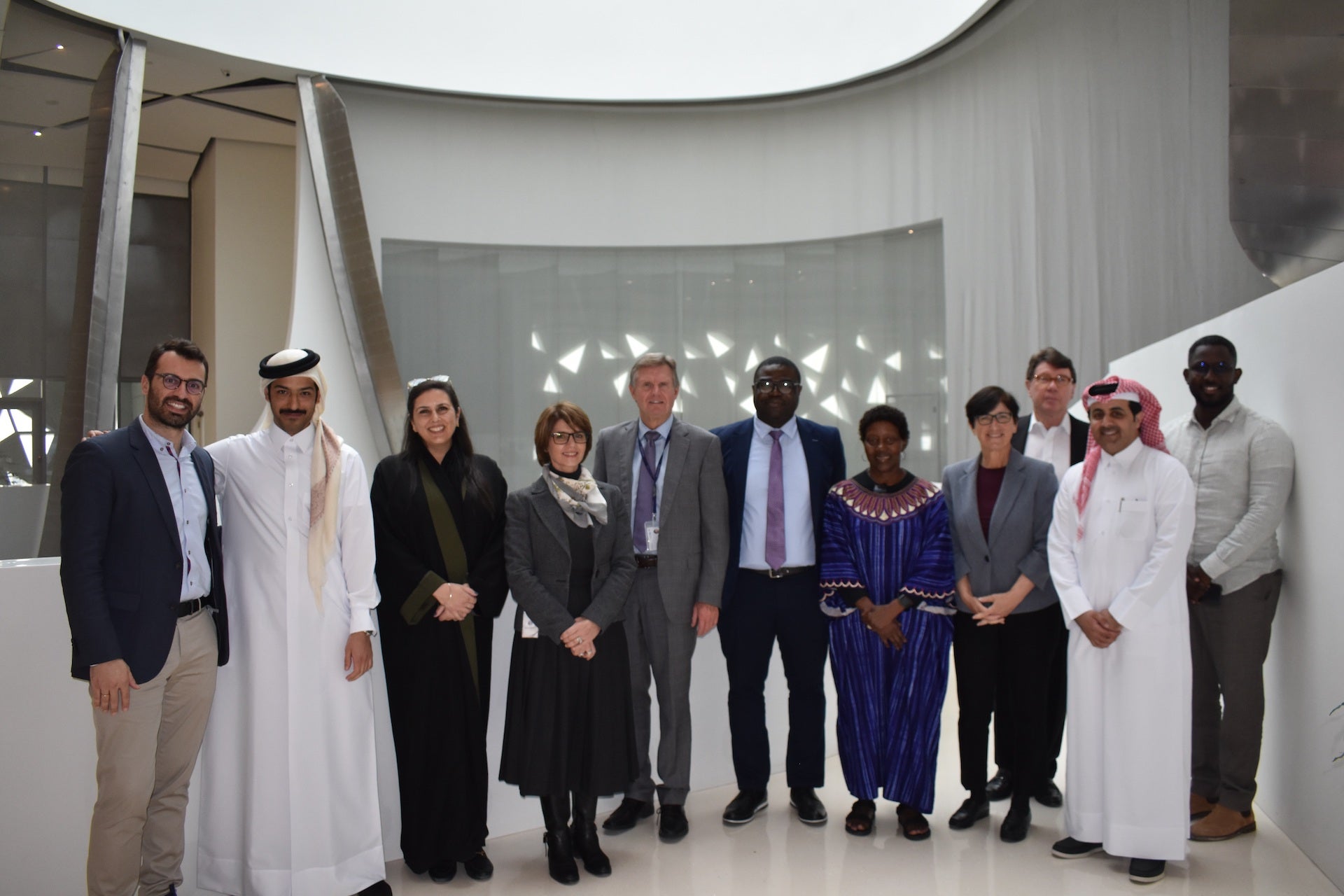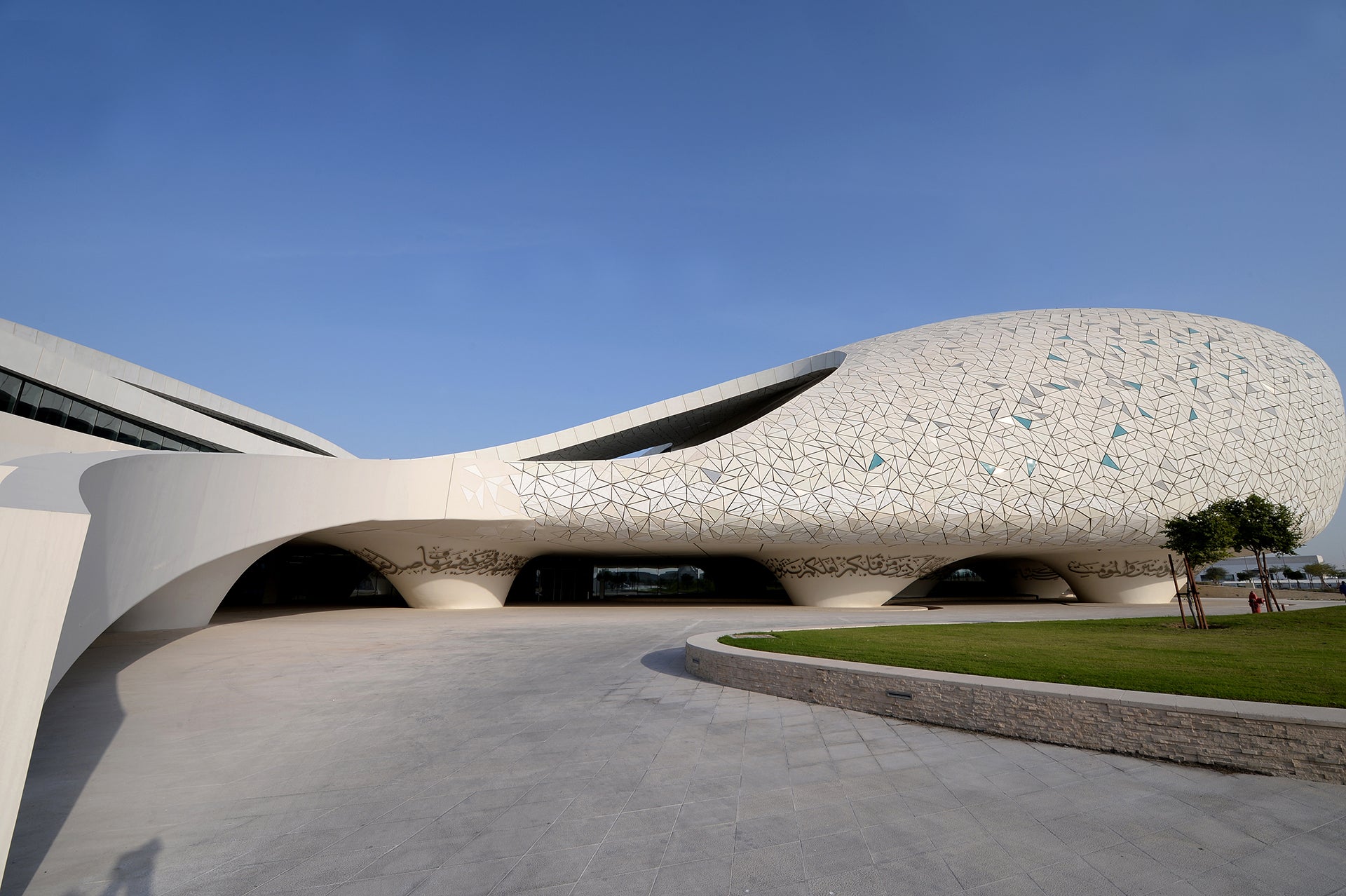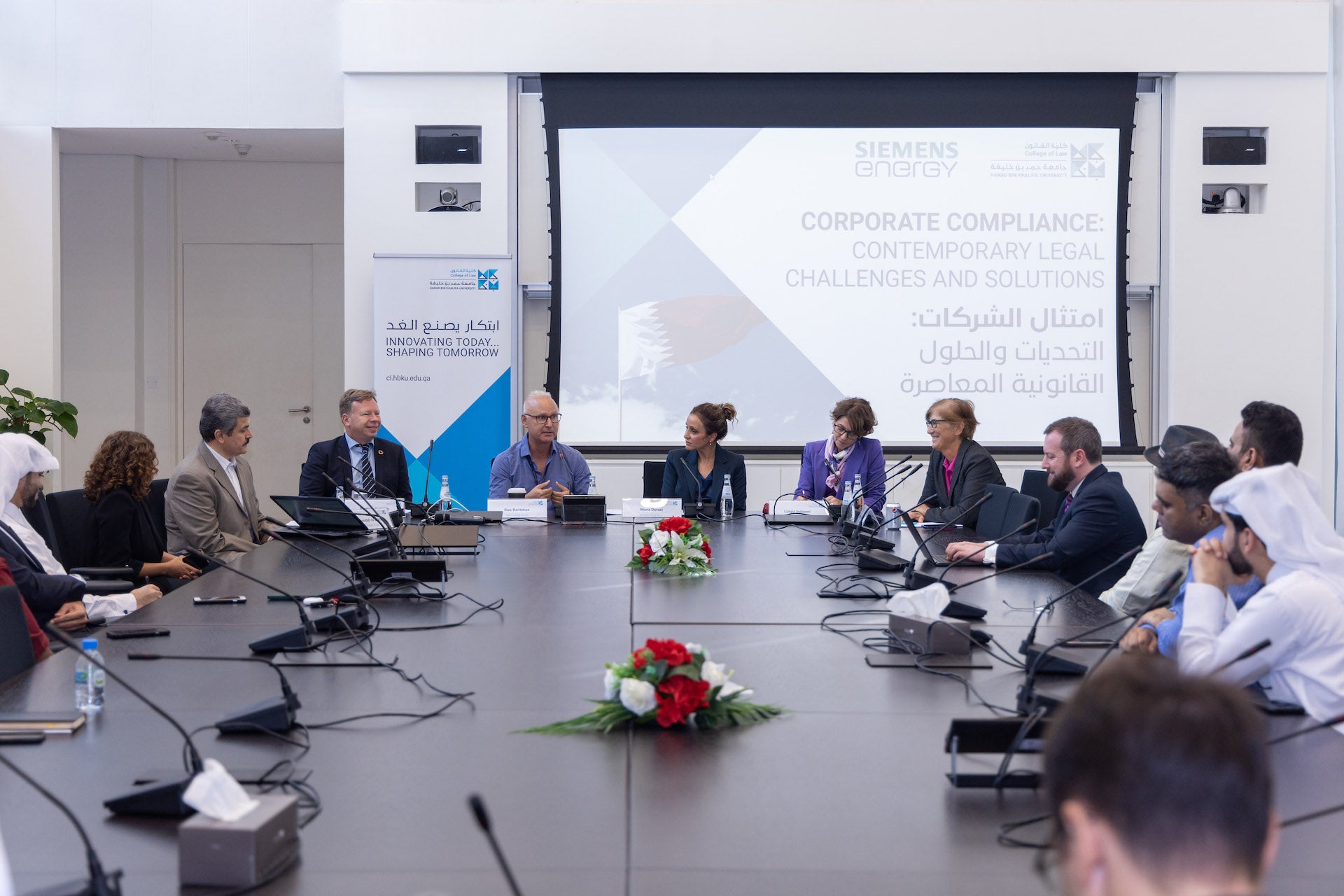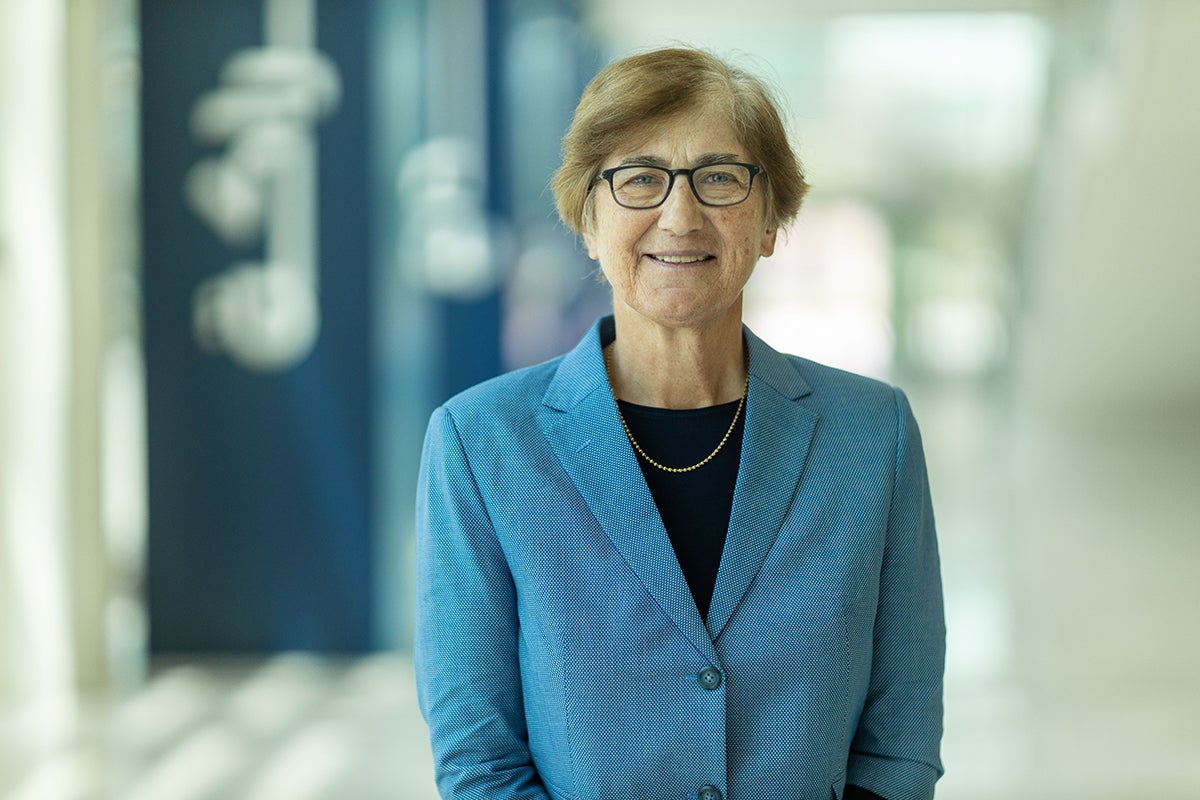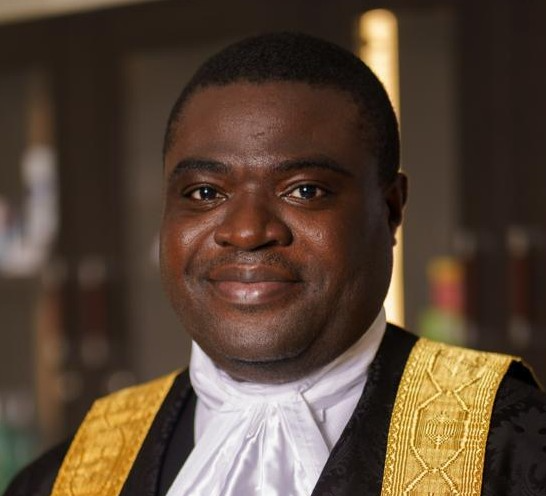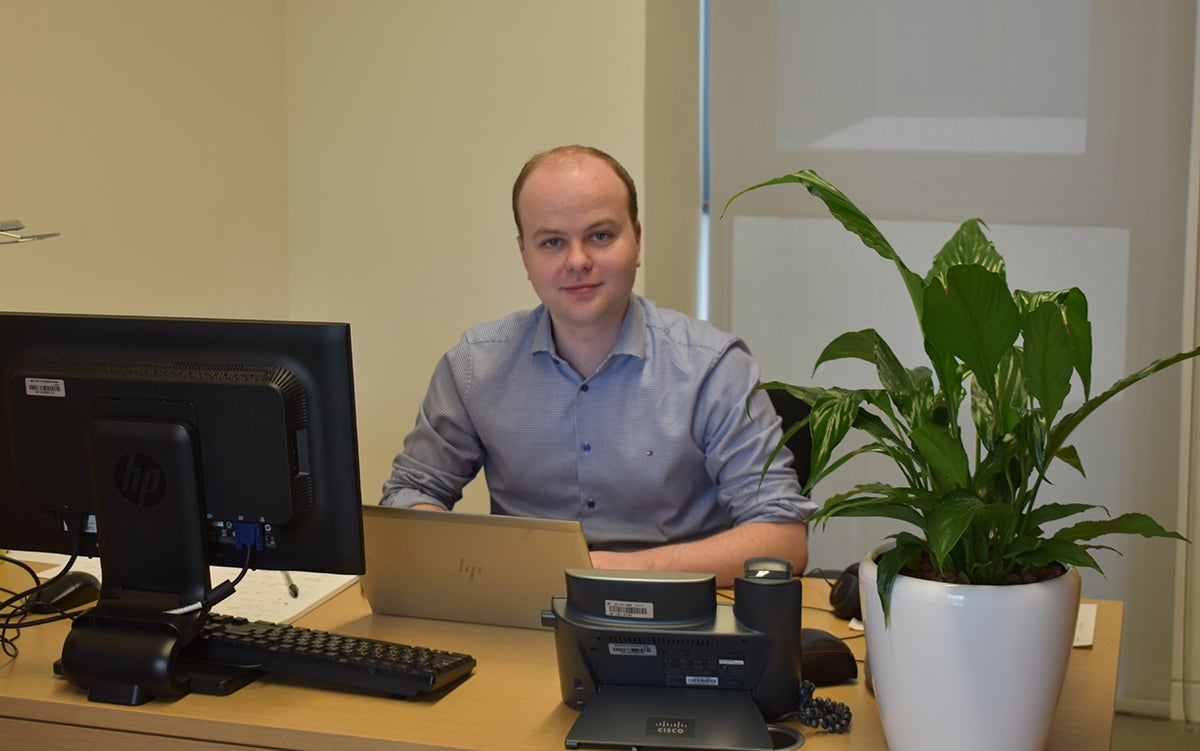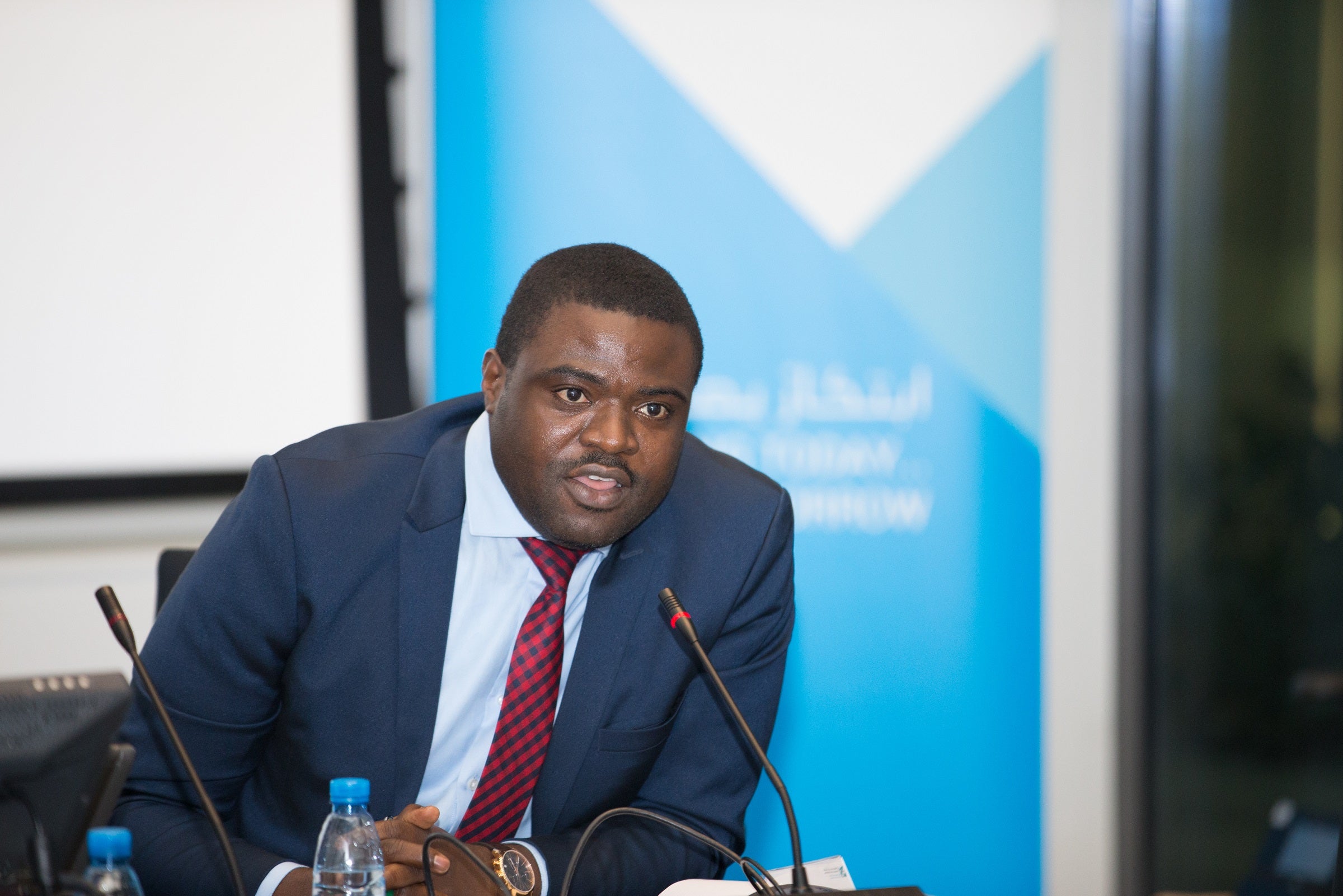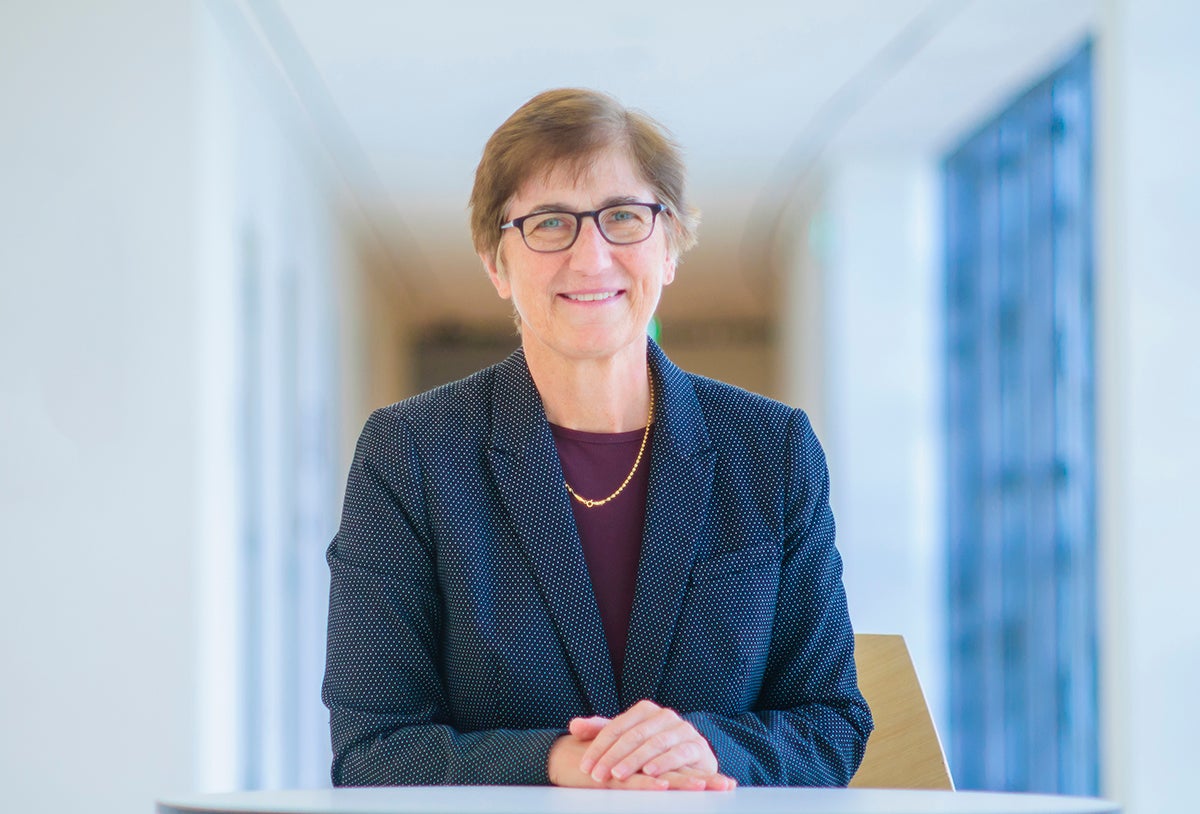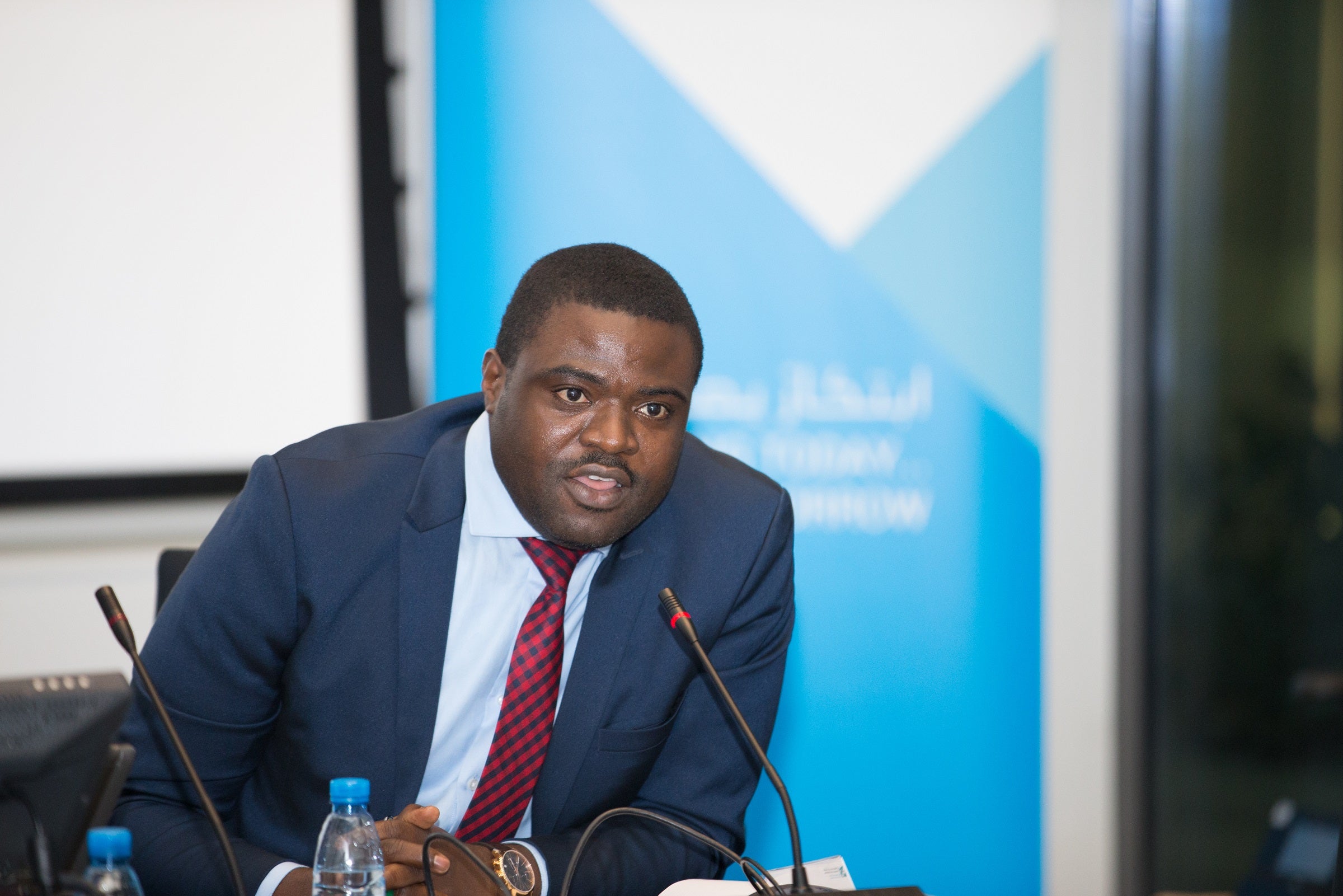
Seminar Features Legal Experts in Natural Gas Energy Transitions
College of Law and UNESCO Chair at HBKU launch new Palgrave Handbook
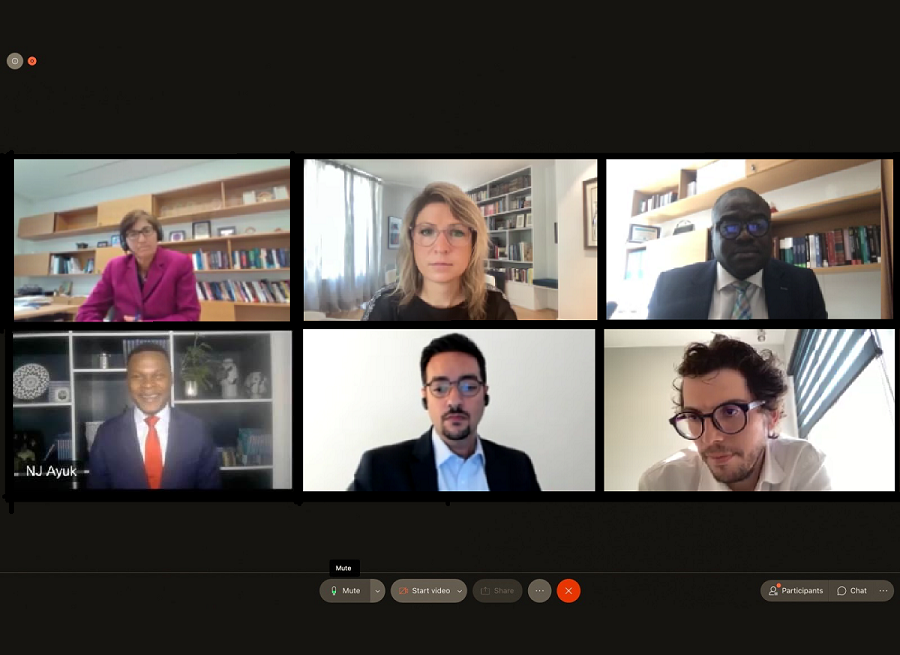
Aiming to advance critical analysis of the intersection between energy demands, natural gas, and environmental sustainability, the College of Law at Hamad Bin Khalifa University (HBKU) organized an online seminar on August 3 to examine key subjects from the new book “The Palgrave Handbook of Natural Gas and Global Energy Transitions”.
The event also marked the global launch of the book in the presence of the editors, Dr. Damilola S. Olawuyi, Associate Dean for Research and UNESCO Chairholder on Environmental Law and Sustainable Development at HBKU’s College of Law, and Dr. Eduardo G. Pereira, Founding Partner of the International Energy Law Training and Research Company, and the International Energy Law Advisory Group. Several of the contributing authors also participated in the session.
The seminar examined the important role of natural gas in global energy transitions, and analyzed how gas rich countries, including Qatar, can leverage their comparative advantages as safe, reliable, and sustainable suppliers. As an authoritative reference work, the Palgrave Handbook analyzes case studies from every major world region to understand recent innovations and outline future strategies.
The event included a keynote address by the Executive Chairman of the African Energy Chamber, N.J. Ayuk. Sharing their learned insights were Omran H. Al-Kuwari, Chief Executive Officer of Qatar Foundation International; Professor Elisabeta Smaranda Olarinde, FCArb, FCAI, Vice Chancellor of Afe Babalola University, Nigeria; Dr. James Henderson, Director of the Energy Transition Research Initiative, Oxford Institute for Energy Studies; and Dr. Miriam R. Aczel, Postdoctoral Scholar at the University of California, Berkeley.
The speakers elaborated on the book’s themes, touching on the emerging transition risks in the natural gas industry, and the latest legal, policy, fiscal, contractual, and sustainability innovations in natural gas markets across the world in response to these risks. Resilience planning, low-carbon business models, green procurement, climate-smart infrastructure development, accountability, gender justice, and other sustainability safeguards are, according to the authors, among the measures needed to maximize the full value of natural gas, both to catalyze a just and equitable energy transition and ensure energy security across the world.
Dean Susan L. Karamanian, College of Law, who presented the opening remarks, said: “The seminar offered a wealth of expertise to better understand the unfolding complexities of the transition in global energy markets, which are set out in more detail in the Palgrave Handbook. Congratulations to Dr. Olawuyi and Dr. Pereira on their timely work and thanks to our leading panel of authors for their thoroughly informative presentations, which highlighted the central role of the law in enabling the energy transition while advancing environmentally sustainable economic development.”
Dr. Olawuyi, recently appointed a member of the United Nations Working Group on Business and Human Rights, noted: “Globally, a growing energy demand coincides with the need to accelerate a just and clean energy transition. The uniquely comprehensive scope of our discussions, which we expand on in the book, has brought to light the important role of natural gas in the clean energy transition. The ongoing technology innovations in the natural gas industry offer a broad scope for much needed future research. We are well placed to lead these through the UNESCO Chair on Environmental Law and Sustainable Development at HBKU’s College of Law, along with efforts to advance public dialogue and international cooperation on environmental law and sustainability.”
The seminar formed part of the college’s Natural Resources and Sustainability Law Workshop Series, and was organized with the UNESCO Chair at HBKU, UNESCO’s University Twinning and Networking Programme (UNITWIN), and the African Energy Chamber. For more information, please visit https://www.hbku.edu.qa/en/cl/UNESCOchair
Related News

HBKU’S College of Law and Public Policy Colloquium to Examine Dispute Resolution Between Countries
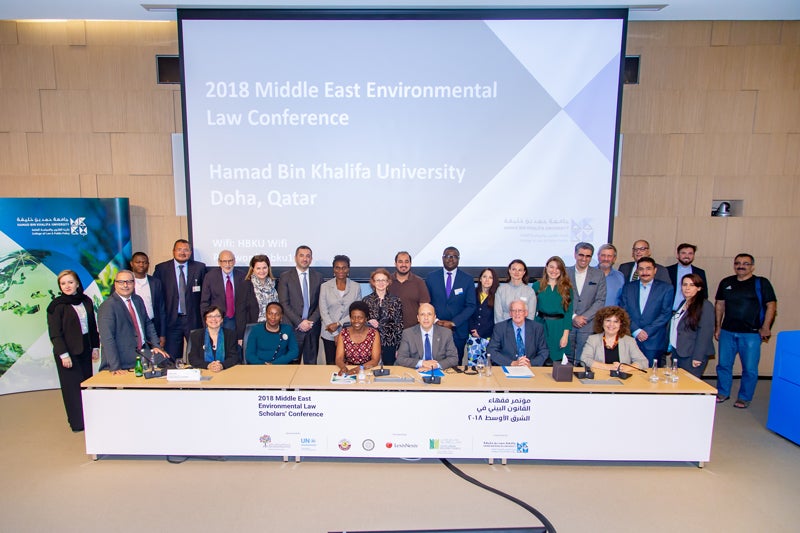
HBKU Conference Highlights Need to Introduce Environmental Law to Higher Education in the Middle East

The Promise of Hybrid Dispute Resolution Fora Conference to be Held at HBKU’s College of Law and Public Policy
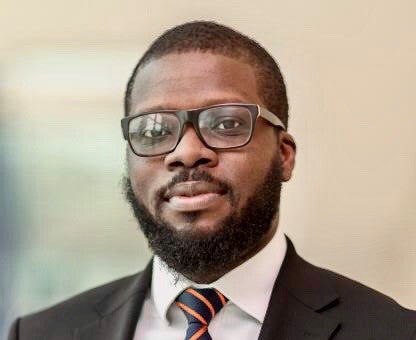
HBKU’s College of Law Faculty Selected on 2020 List of ‘35 Leaders of the Future in Taxation’

College of Law Event Joins Dots Between Eliminating Racism and Achieving Sustainable Societies
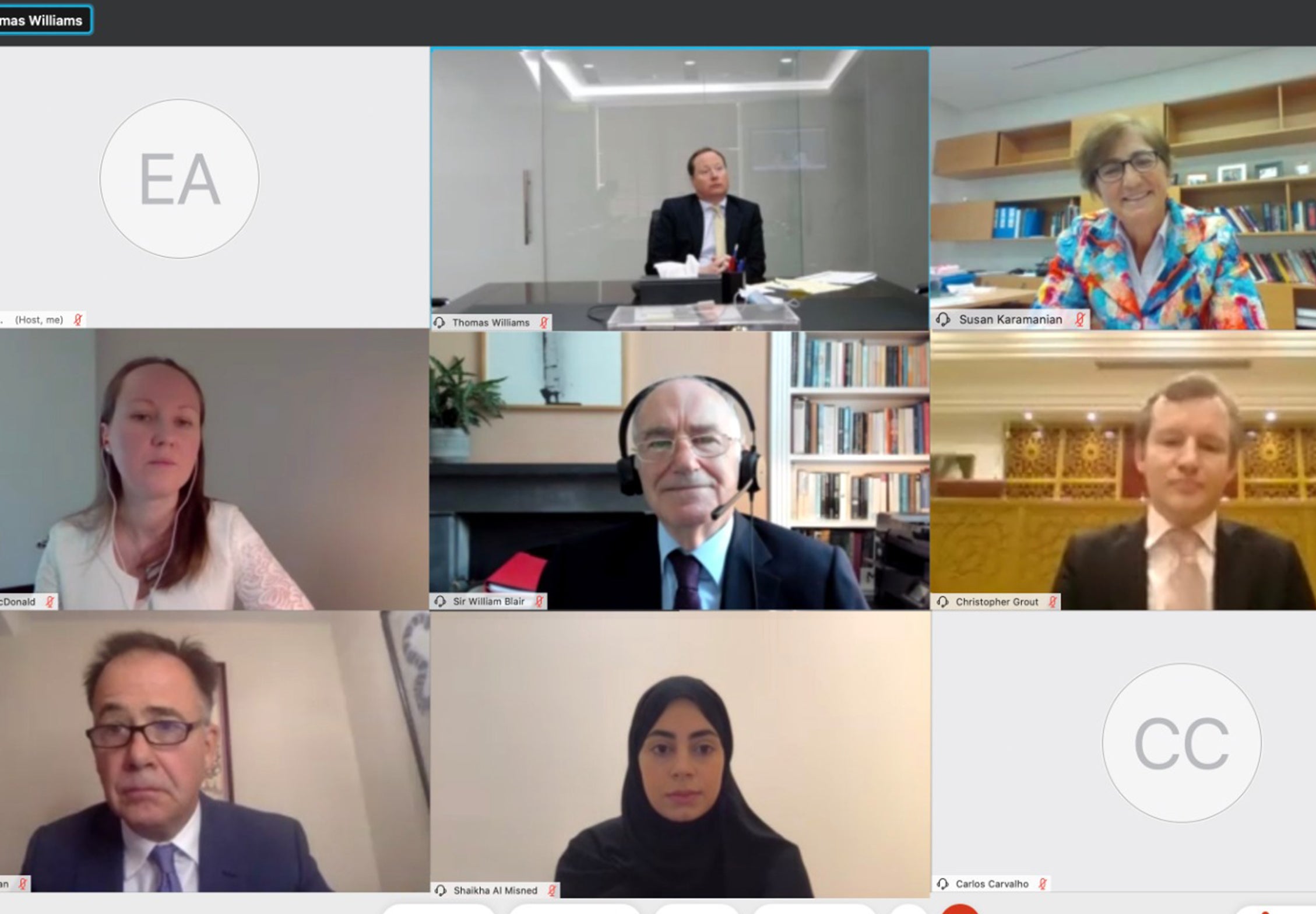
College of Law Webinar Considers Effects of COVID-19 on Commercial Contracts and Sovereign Borrowing
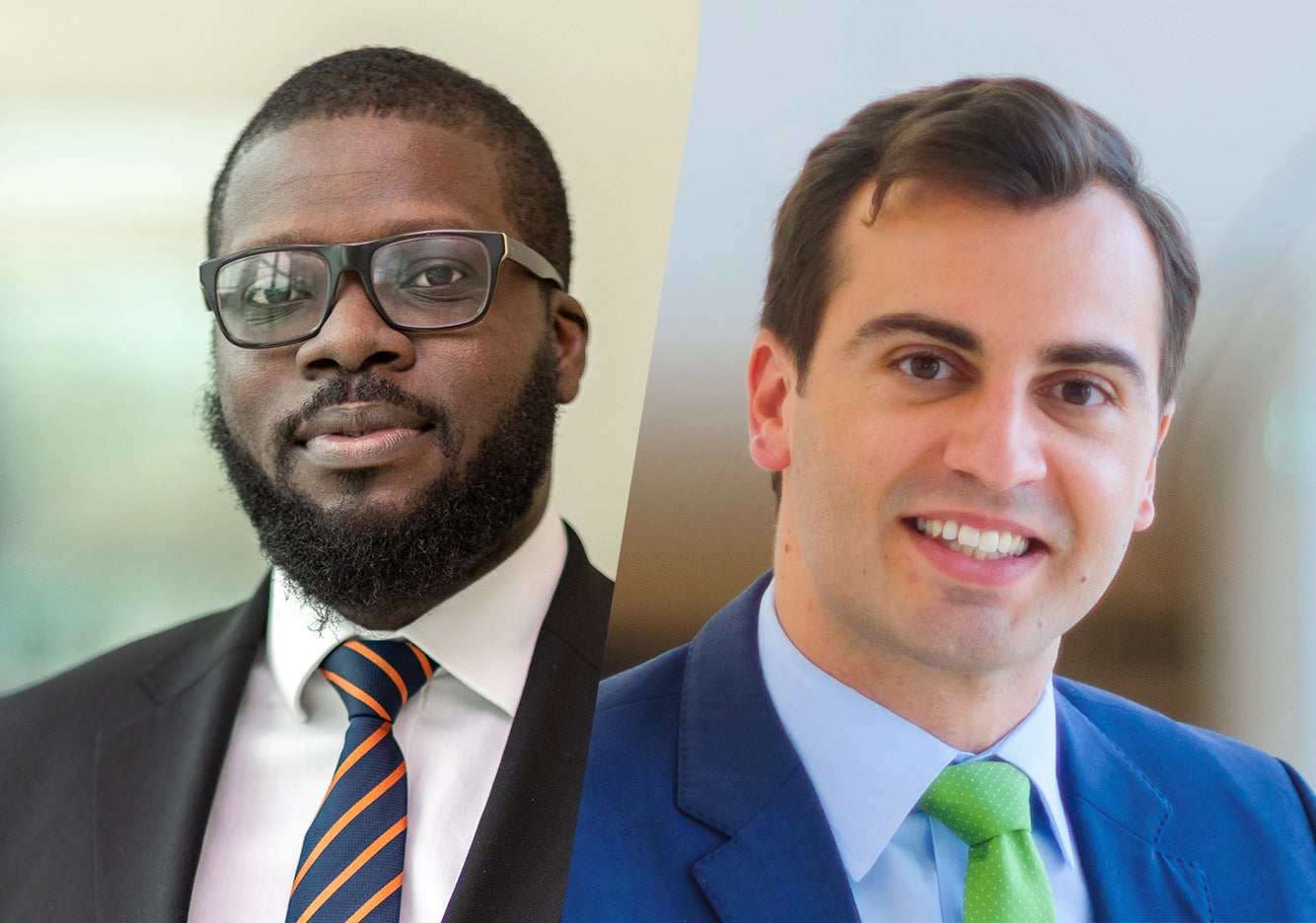
Qatar’s New Public-Private Partnership Law: Towards a Sustainable Approach to Development
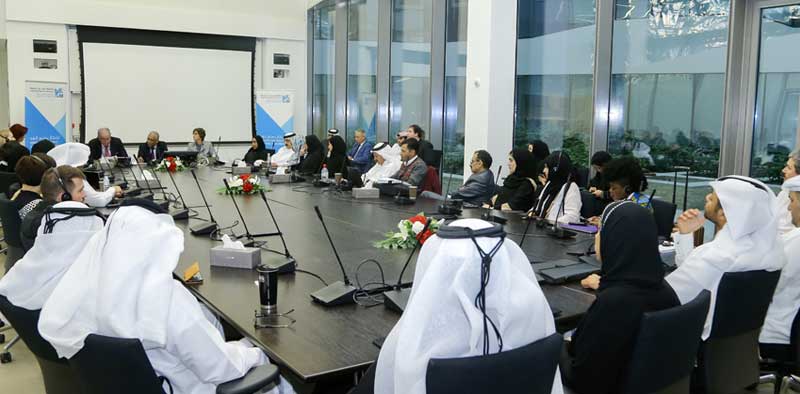
HBKU’s College of Law and Public Policy Hosts Minister-President of Paraguay’s Supreme Court of Justice

HBKU’S College of Law and Public Policy Colloquium to Examine Dispute Resolution Between Countries

HBKU Conference Highlights Need to Introduce Environmental Law to Higher Education in the Middle East

The Promise of Hybrid Dispute Resolution Fora Conference to be Held at HBKU’s College of Law and Public Policy

HBKU’s College of Law Faculty Selected on 2020 List of ‘35 Leaders of the Future in Taxation’

College of Law Event Joins Dots Between Eliminating Racism and Achieving Sustainable Societies

College of Law Webinar Considers Effects of COVID-19 on Commercial Contracts and Sovereign Borrowing

Qatar’s New Public-Private Partnership Law: Towards a Sustainable Approach to Development

HBKU’s College of Law and Public Policy Hosts Minister-President of Paraguay’s Supreme Court of Justice

HBKU’S College of Law and Public Policy Colloquium to Examine Dispute Resolution Between Countries

HBKU Conference Highlights Need to Introduce Environmental Law to Higher Education in the Middle East

The Promise of Hybrid Dispute Resolution Fora Conference to be Held at HBKU’s College of Law and Public Policy

HBKU’s College of Law Faculty Selected on 2020 List of ‘35 Leaders of the Future in Taxation’

College of Law Event Joins Dots Between Eliminating Racism and Achieving Sustainable Societies

College of Law Webinar Considers Effects of COVID-19 on Commercial Contracts and Sovereign Borrowing

Qatar’s New Public-Private Partnership Law: Towards a Sustainable Approach to Development

HBKU’s College of Law and Public Policy Hosts Minister-President of Paraguay’s Supreme Court of Justice

HBKU’S College of Law and Public Policy Colloquium to Examine Dispute Resolution Between Countries

HBKU Conference Highlights Need to Introduce Environmental Law to Higher Education in the Middle East

The Promise of Hybrid Dispute Resolution Fora Conference to be Held at HBKU’s College of Law and Public Policy

HBKU’s College of Law Faculty Selected on 2020 List of ‘35 Leaders of the Future in Taxation’

College of Law Event Joins Dots Between Eliminating Racism and Achieving Sustainable Societies

College of Law Webinar Considers Effects of COVID-19 on Commercial Contracts and Sovereign Borrowing

Qatar’s New Public-Private Partnership Law: Towards a Sustainable Approach to Development

HBKU’s College of Law and Public Policy Hosts Minister-President of Paraguay’s Supreme Court of Justice

HBKU’S College of Law and Public Policy Colloquium to Examine Dispute Resolution Between Countries

HBKU Conference Highlights Need to Introduce Environmental Law to Higher Education in the Middle East

The Promise of Hybrid Dispute Resolution Fora Conference to be Held at HBKU’s College of Law and Public Policy

HBKU’s College of Law Faculty Selected on 2020 List of ‘35 Leaders of the Future in Taxation’

College of Law Event Joins Dots Between Eliminating Racism and Achieving Sustainable Societies

College of Law Webinar Considers Effects of COVID-19 on Commercial Contracts and Sovereign Borrowing

Qatar’s New Public-Private Partnership Law: Towards a Sustainable Approach to Development

HBKU’s College of Law and Public Policy Hosts Minister-President of Paraguay’s Supreme Court of Justice

HBKU’S College of Law and Public Policy Colloquium to Examine Dispute Resolution Between Countries

HBKU Conference Highlights Need to Introduce Environmental Law to Higher Education in the Middle East

The Promise of Hybrid Dispute Resolution Fora Conference to be Held at HBKU’s College of Law and Public Policy

HBKU’s College of Law Faculty Selected on 2020 List of ‘35 Leaders of the Future in Taxation’

College of Law Event Joins Dots Between Eliminating Racism and Achieving Sustainable Societies

College of Law Webinar Considers Effects of COVID-19 on Commercial Contracts and Sovereign Borrowing

Qatar’s New Public-Private Partnership Law: Towards a Sustainable Approach to Development

HBKU’s College of Law and Public Policy Hosts Minister-President of Paraguay’s Supreme Court of Justice

HBKU’S College of Law and Public Policy Colloquium to Examine Dispute Resolution Between Countries

HBKU Conference Highlights Need to Introduce Environmental Law to Higher Education in the Middle East

The Promise of Hybrid Dispute Resolution Fora Conference to be Held at HBKU’s College of Law and Public Policy

HBKU’s College of Law Faculty Selected on 2020 List of ‘35 Leaders of the Future in Taxation’

College of Law Event Joins Dots Between Eliminating Racism and Achieving Sustainable Societies

College of Law Webinar Considers Effects of COVID-19 on Commercial Contracts and Sovereign Borrowing

Qatar’s New Public-Private Partnership Law: Towards a Sustainable Approach to Development

HBKU’s College of Law and Public Policy Hosts Minister-President of Paraguay’s Supreme Court of Justice

HBKU’S College of Law and Public Policy Colloquium to Examine Dispute Resolution Between Countries

HBKU Conference Highlights Need to Introduce Environmental Law to Higher Education in the Middle East

The Promise of Hybrid Dispute Resolution Fora Conference to be Held at HBKU’s College of Law and Public Policy

HBKU’s College of Law Faculty Selected on 2020 List of ‘35 Leaders of the Future in Taxation’

College of Law Event Joins Dots Between Eliminating Racism and Achieving Sustainable Societies

College of Law Webinar Considers Effects of COVID-19 on Commercial Contracts and Sovereign Borrowing

Qatar’s New Public-Private Partnership Law: Towards a Sustainable Approach to Development

HBKU’s College of Law and Public Policy Hosts Minister-President of Paraguay’s Supreme Court of Justice

HBKU’S College of Law and Public Policy Colloquium to Examine Dispute Resolution Between Countries

HBKU Conference Highlights Need to Introduce Environmental Law to Higher Education in the Middle East

The Promise of Hybrid Dispute Resolution Fora Conference to be Held at HBKU’s College of Law and Public Policy

HBKU’s College of Law Faculty Selected on 2020 List of ‘35 Leaders of the Future in Taxation’

College of Law Event Joins Dots Between Eliminating Racism and Achieving Sustainable Societies

College of Law Webinar Considers Effects of COVID-19 on Commercial Contracts and Sovereign Borrowing

Qatar’s New Public-Private Partnership Law: Towards a Sustainable Approach to Development

HBKU’s College of Law and Public Policy Hosts Minister-President of Paraguay’s Supreme Court of Justice

HBKU’S College of Law and Public Policy Colloquium to Examine Dispute Resolution Between Countries

HBKU Conference Highlights Need to Introduce Environmental Law to Higher Education in the Middle East

The Promise of Hybrid Dispute Resolution Fora Conference to be Held at HBKU’s College of Law and Public Policy

HBKU’s College of Law Faculty Selected on 2020 List of ‘35 Leaders of the Future in Taxation’

College of Law Event Joins Dots Between Eliminating Racism and Achieving Sustainable Societies

College of Law Webinar Considers Effects of COVID-19 on Commercial Contracts and Sovereign Borrowing

Qatar’s New Public-Private Partnership Law: Towards a Sustainable Approach to Development

HBKU’s College of Law and Public Policy Hosts Minister-President of Paraguay’s Supreme Court of Justice

HBKU’S College of Law and Public Policy Colloquium to Examine Dispute Resolution Between Countries

HBKU Conference Highlights Need to Introduce Environmental Law to Higher Education in the Middle East

The Promise of Hybrid Dispute Resolution Fora Conference to be Held at HBKU’s College of Law and Public Policy

HBKU’s College of Law Faculty Selected on 2020 List of ‘35 Leaders of the Future in Taxation’

College of Law Event Joins Dots Between Eliminating Racism and Achieving Sustainable Societies

College of Law Webinar Considers Effects of COVID-19 on Commercial Contracts and Sovereign Borrowing

Qatar’s New Public-Private Partnership Law: Towards a Sustainable Approach to Development

HBKU’s College of Law and Public Policy Hosts Minister-President of Paraguay’s Supreme Court of Justice

HBKU’S College of Law and Public Policy Colloquium to Examine Dispute Resolution Between Countries

HBKU Conference Highlights Need to Introduce Environmental Law to Higher Education in the Middle East

The Promise of Hybrid Dispute Resolution Fora Conference to be Held at HBKU’s College of Law and Public Policy

HBKU’s College of Law Faculty Selected on 2020 List of ‘35 Leaders of the Future in Taxation’

College of Law Event Joins Dots Between Eliminating Racism and Achieving Sustainable Societies

College of Law Webinar Considers Effects of COVID-19 on Commercial Contracts and Sovereign Borrowing

Qatar’s New Public-Private Partnership Law: Towards a Sustainable Approach to Development

HBKU’s College of Law and Public Policy Hosts Minister-President of Paraguay’s Supreme Court of Justice

HBKU’S College of Law and Public Policy Colloquium to Examine Dispute Resolution Between Countries

HBKU Conference Highlights Need to Introduce Environmental Law to Higher Education in the Middle East

The Promise of Hybrid Dispute Resolution Fora Conference to be Held at HBKU’s College of Law and Public Policy

HBKU’s College of Law Faculty Selected on 2020 List of ‘35 Leaders of the Future in Taxation’

College of Law Event Joins Dots Between Eliminating Racism and Achieving Sustainable Societies

College of Law Webinar Considers Effects of COVID-19 on Commercial Contracts and Sovereign Borrowing

Qatar’s New Public-Private Partnership Law: Towards a Sustainable Approach to Development

HBKU’s College of Law and Public Policy Hosts Minister-President of Paraguay’s Supreme Court of Justice

HBKU’S College of Law and Public Policy Colloquium to Examine Dispute Resolution Between Countries

HBKU Conference Highlights Need to Introduce Environmental Law to Higher Education in the Middle East

The Promise of Hybrid Dispute Resolution Fora Conference to be Held at HBKU’s College of Law and Public Policy

HBKU’s College of Law Faculty Selected on 2020 List of ‘35 Leaders of the Future in Taxation’

College of Law Event Joins Dots Between Eliminating Racism and Achieving Sustainable Societies

College of Law Webinar Considers Effects of COVID-19 on Commercial Contracts and Sovereign Borrowing

Qatar’s New Public-Private Partnership Law: Towards a Sustainable Approach to Development

HBKU’s College of Law and Public Policy Hosts Minister-President of Paraguay’s Supreme Court of Justice

HBKU’S College of Law and Public Policy Colloquium to Examine Dispute Resolution Between Countries

HBKU Conference Highlights Need to Introduce Environmental Law to Higher Education in the Middle East

The Promise of Hybrid Dispute Resolution Fora Conference to be Held at HBKU’s College of Law and Public Policy

HBKU’s College of Law Faculty Selected on 2020 List of ‘35 Leaders of the Future in Taxation’

College of Law Event Joins Dots Between Eliminating Racism and Achieving Sustainable Societies

College of Law Webinar Considers Effects of COVID-19 on Commercial Contracts and Sovereign Borrowing

Qatar’s New Public-Private Partnership Law: Towards a Sustainable Approach to Development

HBKU’s College of Law and Public Policy Hosts Minister-President of Paraguay’s Supreme Court of Justice

HBKU’S College of Law and Public Policy Colloquium to Examine Dispute Resolution Between Countries

HBKU Conference Highlights Need to Introduce Environmental Law to Higher Education in the Middle East

The Promise of Hybrid Dispute Resolution Fora Conference to be Held at HBKU’s College of Law and Public Policy

HBKU’s College of Law Faculty Selected on 2020 List of ‘35 Leaders of the Future in Taxation’

College of Law Event Joins Dots Between Eliminating Racism and Achieving Sustainable Societies

College of Law Webinar Considers Effects of COVID-19 on Commercial Contracts and Sovereign Borrowing

Qatar’s New Public-Private Partnership Law: Towards a Sustainable Approach to Development

HBKU’s College of Law and Public Policy Hosts Minister-President of Paraguay’s Supreme Court of Justice

HBKU’S College of Law and Public Policy Colloquium to Examine Dispute Resolution Between Countries

HBKU Conference Highlights Need to Introduce Environmental Law to Higher Education in the Middle East

The Promise of Hybrid Dispute Resolution Fora Conference to be Held at HBKU’s College of Law and Public Policy

HBKU’s College of Law Faculty Selected on 2020 List of ‘35 Leaders of the Future in Taxation’

College of Law Event Joins Dots Between Eliminating Racism and Achieving Sustainable Societies

College of Law Webinar Considers Effects of COVID-19 on Commercial Contracts and Sovereign Borrowing

Qatar’s New Public-Private Partnership Law: Towards a Sustainable Approach to Development

HBKU’s College of Law and Public Policy Hosts Minister-President of Paraguay’s Supreme Court of Justice

HBKU’S College of Law and Public Policy Colloquium to Examine Dispute Resolution Between Countries

HBKU Conference Highlights Need to Introduce Environmental Law to Higher Education in the Middle East

The Promise of Hybrid Dispute Resolution Fora Conference to be Held at HBKU’s College of Law and Public Policy

HBKU’s College of Law Faculty Selected on 2020 List of ‘35 Leaders of the Future in Taxation’

College of Law Event Joins Dots Between Eliminating Racism and Achieving Sustainable Societies

College of Law Webinar Considers Effects of COVID-19 on Commercial Contracts and Sovereign Borrowing

Qatar’s New Public-Private Partnership Law: Towards a Sustainable Approach to Development

HBKU’s College of Law and Public Policy Hosts Minister-President of Paraguay’s Supreme Court of Justice

HBKU’S College of Law and Public Policy Colloquium to Examine Dispute Resolution Between Countries

HBKU Conference Highlights Need to Introduce Environmental Law to Higher Education in the Middle East

The Promise of Hybrid Dispute Resolution Fora Conference to be Held at HBKU’s College of Law and Public Policy

HBKU’s College of Law Faculty Selected on 2020 List of ‘35 Leaders of the Future in Taxation’

College of Law Event Joins Dots Between Eliminating Racism and Achieving Sustainable Societies

College of Law Webinar Considers Effects of COVID-19 on Commercial Contracts and Sovereign Borrowing

Qatar’s New Public-Private Partnership Law: Towards a Sustainable Approach to Development

HBKU’s College of Law and Public Policy Hosts Minister-President of Paraguay’s Supreme Court of Justice

HBKU’S College of Law and Public Policy Colloquium to Examine Dispute Resolution Between Countries

HBKU Conference Highlights Need to Introduce Environmental Law to Higher Education in the Middle East

The Promise of Hybrid Dispute Resolution Fora Conference to be Held at HBKU’s College of Law and Public Policy

HBKU’s College of Law Faculty Selected on 2020 List of ‘35 Leaders of the Future in Taxation’

College of Law Event Joins Dots Between Eliminating Racism and Achieving Sustainable Societies

College of Law Webinar Considers Effects of COVID-19 on Commercial Contracts and Sovereign Borrowing

Qatar’s New Public-Private Partnership Law: Towards a Sustainable Approach to Development

HBKU’s College of Law and Public Policy Hosts Minister-President of Paraguay’s Supreme Court of Justice

HBKU’S College of Law and Public Policy Colloquium to Examine Dispute Resolution Between Countries

HBKU Conference Highlights Need to Introduce Environmental Law to Higher Education in the Middle East

The Promise of Hybrid Dispute Resolution Fora Conference to be Held at HBKU’s College of Law and Public Policy

HBKU’s College of Law Faculty Selected on 2020 List of ‘35 Leaders of the Future in Taxation’

College of Law Event Joins Dots Between Eliminating Racism and Achieving Sustainable Societies

College of Law Webinar Considers Effects of COVID-19 on Commercial Contracts and Sovereign Borrowing

Qatar’s New Public-Private Partnership Law: Towards a Sustainable Approach to Development

HBKU’s College of Law and Public Policy Hosts Minister-President of Paraguay’s Supreme Court of Justice

HBKU’S College of Law and Public Policy Colloquium to Examine Dispute Resolution Between Countries

HBKU Conference Highlights Need to Introduce Environmental Law to Higher Education in the Middle East

The Promise of Hybrid Dispute Resolution Fora Conference to be Held at HBKU’s College of Law and Public Policy

HBKU’s College of Law Faculty Selected on 2020 List of ‘35 Leaders of the Future in Taxation’

College of Law Event Joins Dots Between Eliminating Racism and Achieving Sustainable Societies

College of Law Webinar Considers Effects of COVID-19 on Commercial Contracts and Sovereign Borrowing

Qatar’s New Public-Private Partnership Law: Towards a Sustainable Approach to Development

HBKU’s College of Law and Public Policy Hosts Minister-President of Paraguay’s Supreme Court of Justice

HBKU’S College of Law and Public Policy Colloquium to Examine Dispute Resolution Between Countries

HBKU Conference Highlights Need to Introduce Environmental Law to Higher Education in the Middle East

The Promise of Hybrid Dispute Resolution Fora Conference to be Held at HBKU’s College of Law and Public Policy

HBKU’s College of Law Faculty Selected on 2020 List of ‘35 Leaders of the Future in Taxation’

College of Law Event Joins Dots Between Eliminating Racism and Achieving Sustainable Societies

College of Law Webinar Considers Effects of COVID-19 on Commercial Contracts and Sovereign Borrowing

Qatar’s New Public-Private Partnership Law: Towards a Sustainable Approach to Development

HBKU’s College of Law and Public Policy Hosts Minister-President of Paraguay’s Supreme Court of Justice

HBKU’S College of Law and Public Policy Colloquium to Examine Dispute Resolution Between Countries

HBKU Conference Highlights Need to Introduce Environmental Law to Higher Education in the Middle East

The Promise of Hybrid Dispute Resolution Fora Conference to be Held at HBKU’s College of Law and Public Policy

HBKU’s College of Law Faculty Selected on 2020 List of ‘35 Leaders of the Future in Taxation’

College of Law Event Joins Dots Between Eliminating Racism and Achieving Sustainable Societies

College of Law Webinar Considers Effects of COVID-19 on Commercial Contracts and Sovereign Borrowing

Qatar’s New Public-Private Partnership Law: Towards a Sustainable Approach to Development

HBKU’s College of Law and Public Policy Hosts Minister-President of Paraguay’s Supreme Court of Justice

HBKU’S College of Law and Public Policy Colloquium to Examine Dispute Resolution Between Countries

HBKU Conference Highlights Need to Introduce Environmental Law to Higher Education in the Middle East

The Promise of Hybrid Dispute Resolution Fora Conference to be Held at HBKU’s College of Law and Public Policy

HBKU’s College of Law Faculty Selected on 2020 List of ‘35 Leaders of the Future in Taxation’

College of Law Event Joins Dots Between Eliminating Racism and Achieving Sustainable Societies

College of Law Webinar Considers Effects of COVID-19 on Commercial Contracts and Sovereign Borrowing

Qatar’s New Public-Private Partnership Law: Towards a Sustainable Approach to Development

HBKU’s College of Law and Public Policy Hosts Minister-President of Paraguay’s Supreme Court of Justice

HBKU’S College of Law and Public Policy Colloquium to Examine Dispute Resolution Between Countries

HBKU Conference Highlights Need to Introduce Environmental Law to Higher Education in the Middle East

The Promise of Hybrid Dispute Resolution Fora Conference to be Held at HBKU’s College of Law and Public Policy

HBKU’s College of Law Faculty Selected on 2020 List of ‘35 Leaders of the Future in Taxation’

College of Law Event Joins Dots Between Eliminating Racism and Achieving Sustainable Societies

College of Law Webinar Considers Effects of COVID-19 on Commercial Contracts and Sovereign Borrowing

Qatar’s New Public-Private Partnership Law: Towards a Sustainable Approach to Development

HBKU’s College of Law and Public Policy Hosts Minister-President of Paraguay’s Supreme Court of Justice

HBKU’S College of Law and Public Policy Colloquium to Examine Dispute Resolution Between Countries

HBKU Conference Highlights Need to Introduce Environmental Law to Higher Education in the Middle East

The Promise of Hybrid Dispute Resolution Fora Conference to be Held at HBKU’s College of Law and Public Policy

HBKU’s College of Law Faculty Selected on 2020 List of ‘35 Leaders of the Future in Taxation’

College of Law Event Joins Dots Between Eliminating Racism and Achieving Sustainable Societies

College of Law Webinar Considers Effects of COVID-19 on Commercial Contracts and Sovereign Borrowing

Qatar’s New Public-Private Partnership Law: Towards a Sustainable Approach to Development

HBKU’s College of Law and Public Policy Hosts Minister-President of Paraguay’s Supreme Court of Justice

HBKU’S College of Law and Public Policy Colloquium to Examine Dispute Resolution Between Countries

HBKU Conference Highlights Need to Introduce Environmental Law to Higher Education in the Middle East

The Promise of Hybrid Dispute Resolution Fora Conference to be Held at HBKU’s College of Law and Public Policy

HBKU’s College of Law Faculty Selected on 2020 List of ‘35 Leaders of the Future in Taxation’

College of Law Event Joins Dots Between Eliminating Racism and Achieving Sustainable Societies

College of Law Webinar Considers Effects of COVID-19 on Commercial Contracts and Sovereign Borrowing

Qatar’s New Public-Private Partnership Law: Towards a Sustainable Approach to Development

HBKU’s College of Law and Public Policy Hosts Minister-President of Paraguay’s Supreme Court of Justice

HBKU’S College of Law and Public Policy Colloquium to Examine Dispute Resolution Between Countries

HBKU Conference Highlights Need to Introduce Environmental Law to Higher Education in the Middle East

The Promise of Hybrid Dispute Resolution Fora Conference to be Held at HBKU’s College of Law and Public Policy

HBKU’s College of Law Faculty Selected on 2020 List of ‘35 Leaders of the Future in Taxation’

College of Law Event Joins Dots Between Eliminating Racism and Achieving Sustainable Societies

College of Law Webinar Considers Effects of COVID-19 on Commercial Contracts and Sovereign Borrowing

Qatar’s New Public-Private Partnership Law: Towards a Sustainable Approach to Development

HBKU’s College of Law and Public Policy Hosts Minister-President of Paraguay’s Supreme Court of Justice

HBKU’S College of Law and Public Policy Colloquium to Examine Dispute Resolution Between Countries

HBKU Conference Highlights Need to Introduce Environmental Law to Higher Education in the Middle East

The Promise of Hybrid Dispute Resolution Fora Conference to be Held at HBKU’s College of Law and Public Policy

HBKU’s College of Law Faculty Selected on 2020 List of ‘35 Leaders of the Future in Taxation’

College of Law Event Joins Dots Between Eliminating Racism and Achieving Sustainable Societies

College of Law Webinar Considers Effects of COVID-19 on Commercial Contracts and Sovereign Borrowing

Qatar’s New Public-Private Partnership Law: Towards a Sustainable Approach to Development

HBKU’s College of Law and Public Policy Hosts Minister-President of Paraguay’s Supreme Court of Justice

HBKU’S College of Law and Public Policy Colloquium to Examine Dispute Resolution Between Countries

HBKU Conference Highlights Need to Introduce Environmental Law to Higher Education in the Middle East

The Promise of Hybrid Dispute Resolution Fora Conference to be Held at HBKU’s College of Law and Public Policy

HBKU’s College of Law Faculty Selected on 2020 List of ‘35 Leaders of the Future in Taxation’

College of Law Event Joins Dots Between Eliminating Racism and Achieving Sustainable Societies

College of Law Webinar Considers Effects of COVID-19 on Commercial Contracts and Sovereign Borrowing

Qatar’s New Public-Private Partnership Law: Towards a Sustainable Approach to Development

HBKU’s College of Law and Public Policy Hosts Minister-President of Paraguay’s Supreme Court of Justice

HBKU’S College of Law and Public Policy Colloquium to Examine Dispute Resolution Between Countries

HBKU Conference Highlights Need to Introduce Environmental Law to Higher Education in the Middle East

The Promise of Hybrid Dispute Resolution Fora Conference to be Held at HBKU’s College of Law and Public Policy

HBKU’s College of Law Faculty Selected on 2020 List of ‘35 Leaders of the Future in Taxation’

College of Law Event Joins Dots Between Eliminating Racism and Achieving Sustainable Societies

College of Law Webinar Considers Effects of COVID-19 on Commercial Contracts and Sovereign Borrowing

Qatar’s New Public-Private Partnership Law: Towards a Sustainable Approach to Development

HBKU’s College of Law and Public Policy Hosts Minister-President of Paraguay’s Supreme Court of Justice

HBKU’S College of Law and Public Policy Colloquium to Examine Dispute Resolution Between Countries

HBKU Conference Highlights Need to Introduce Environmental Law to Higher Education in the Middle East

The Promise of Hybrid Dispute Resolution Fora Conference to be Held at HBKU’s College of Law and Public Policy

HBKU’s College of Law Faculty Selected on 2020 List of ‘35 Leaders of the Future in Taxation’

College of Law Event Joins Dots Between Eliminating Racism and Achieving Sustainable Societies

College of Law Webinar Considers Effects of COVID-19 on Commercial Contracts and Sovereign Borrowing

Qatar’s New Public-Private Partnership Law: Towards a Sustainable Approach to Development

HBKU’s College of Law and Public Policy Hosts Minister-President of Paraguay’s Supreme Court of Justice

HBKU’S College of Law and Public Policy Colloquium to Examine Dispute Resolution Between Countries

HBKU Conference Highlights Need to Introduce Environmental Law to Higher Education in the Middle East

The Promise of Hybrid Dispute Resolution Fora Conference to be Held at HBKU’s College of Law and Public Policy

HBKU’s College of Law Faculty Selected on 2020 List of ‘35 Leaders of the Future in Taxation’

College of Law Event Joins Dots Between Eliminating Racism and Achieving Sustainable Societies

College of Law Webinar Considers Effects of COVID-19 on Commercial Contracts and Sovereign Borrowing

Qatar’s New Public-Private Partnership Law: Towards a Sustainable Approach to Development

HBKU’s College of Law and Public Policy Hosts Minister-President of Paraguay’s Supreme Court of Justice

HBKU’S College of Law and Public Policy Colloquium to Examine Dispute Resolution Between Countries

HBKU Conference Highlights Need to Introduce Environmental Law to Higher Education in the Middle East

The Promise of Hybrid Dispute Resolution Fora Conference to be Held at HBKU’s College of Law and Public Policy

HBKU’s College of Law Faculty Selected on 2020 List of ‘35 Leaders of the Future in Taxation’

College of Law Event Joins Dots Between Eliminating Racism and Achieving Sustainable Societies

College of Law Webinar Considers Effects of COVID-19 on Commercial Contracts and Sovereign Borrowing

Qatar’s New Public-Private Partnership Law: Towards a Sustainable Approach to Development

HBKU’s College of Law and Public Policy Hosts Minister-President of Paraguay’s Supreme Court of Justice

HBKU’S College of Law and Public Policy Colloquium to Examine Dispute Resolution Between Countries

HBKU Conference Highlights Need to Introduce Environmental Law to Higher Education in the Middle East

The Promise of Hybrid Dispute Resolution Fora Conference to be Held at HBKU’s College of Law and Public Policy

HBKU’s College of Law Faculty Selected on 2020 List of ‘35 Leaders of the Future in Taxation’

College of Law Event Joins Dots Between Eliminating Racism and Achieving Sustainable Societies

College of Law Webinar Considers Effects of COVID-19 on Commercial Contracts and Sovereign Borrowing

Qatar’s New Public-Private Partnership Law: Towards a Sustainable Approach to Development

HBKU’s College of Law and Public Policy Hosts Minister-President of Paraguay’s Supreme Court of Justice

HBKU’S College of Law and Public Policy Colloquium to Examine Dispute Resolution Between Countries

HBKU Conference Highlights Need to Introduce Environmental Law to Higher Education in the Middle East

The Promise of Hybrid Dispute Resolution Fora Conference to be Held at HBKU’s College of Law and Public Policy

HBKU’s College of Law Faculty Selected on 2020 List of ‘35 Leaders of the Future in Taxation’

College of Law Event Joins Dots Between Eliminating Racism and Achieving Sustainable Societies

College of Law Webinar Considers Effects of COVID-19 on Commercial Contracts and Sovereign Borrowing

Qatar’s New Public-Private Partnership Law: Towards a Sustainable Approach to Development

HBKU’s College of Law and Public Policy Hosts Minister-President of Paraguay’s Supreme Court of Justice

HBKU’S College of Law and Public Policy Colloquium to Examine Dispute Resolution Between Countries

HBKU Conference Highlights Need to Introduce Environmental Law to Higher Education in the Middle East

The Promise of Hybrid Dispute Resolution Fora Conference to be Held at HBKU’s College of Law and Public Policy

HBKU’s College of Law Faculty Selected on 2020 List of ‘35 Leaders of the Future in Taxation’

College of Law Event Joins Dots Between Eliminating Racism and Achieving Sustainable Societies

College of Law Webinar Considers Effects of COVID-19 on Commercial Contracts and Sovereign Borrowing

Qatar’s New Public-Private Partnership Law: Towards a Sustainable Approach to Development

HBKU’s College of Law and Public Policy Hosts Minister-President of Paraguay’s Supreme Court of Justice

HBKU’S College of Law and Public Policy Colloquium to Examine Dispute Resolution Between Countries

HBKU Conference Highlights Need to Introduce Environmental Law to Higher Education in the Middle East

The Promise of Hybrid Dispute Resolution Fora Conference to be Held at HBKU’s College of Law and Public Policy

HBKU’s College of Law Faculty Selected on 2020 List of ‘35 Leaders of the Future in Taxation’

College of Law Event Joins Dots Between Eliminating Racism and Achieving Sustainable Societies

College of Law Webinar Considers Effects of COVID-19 on Commercial Contracts and Sovereign Borrowing

Qatar’s New Public-Private Partnership Law: Towards a Sustainable Approach to Development

HBKU’s College of Law and Public Policy Hosts Minister-President of Paraguay’s Supreme Court of Justice

HBKU’S College of Law and Public Policy Colloquium to Examine Dispute Resolution Between Countries

HBKU Conference Highlights Need to Introduce Environmental Law to Higher Education in the Middle East

The Promise of Hybrid Dispute Resolution Fora Conference to be Held at HBKU’s College of Law and Public Policy

HBKU’s College of Law Faculty Selected on 2020 List of ‘35 Leaders of the Future in Taxation’

College of Law Event Joins Dots Between Eliminating Racism and Achieving Sustainable Societies

College of Law Webinar Considers Effects of COVID-19 on Commercial Contracts and Sovereign Borrowing

Qatar’s New Public-Private Partnership Law: Towards a Sustainable Approach to Development

HBKU’s College of Law and Public Policy Hosts Minister-President of Paraguay’s Supreme Court of Justice

HBKU’S College of Law and Public Policy Colloquium to Examine Dispute Resolution Between Countries

HBKU Conference Highlights Need to Introduce Environmental Law to Higher Education in the Middle East






